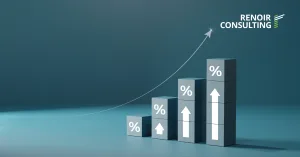At a Glance
- A construction company from Southeast Asia faced challenges with a slow and error-prone invoice payment process, negatively impacting their reputation.
- However, the underlying issues were more complex, as many invoices contained errors, lacked proof of claim, or had other problems requiring checking, validation, and verification before payment.
- This case study breaks down how partnership with Renoir improved the PO to payment processes, resulting up to 30% (PHP 368 million) reduction in open invoice payments within eight weeks.
Key Results
- 30% reduction in open invoice payments valued at PHP 368 million achieved within eight weeks.
- Realised a cost reduction of PHP 381million by week 9.
- Identified and separated PHP 150 million in retention POs that were not yet due
- Supplier relationships were enhanced due to streamlined and timely payment processes.
Background
The client is an Engineering, Design and Development division of a property developer and operator in Southeast Asia. They manage large-scale infrastructure and construction projects that rely heavily on third-party contractors and suppliers.
Inefficient procurement systems can lead to delays in material delivery, which disrupts the entire project timeline. This results in extended project durations, affecting subsequent contracts and client relationships. Furthermore, delayed payments are a significant issue in construction contracts, affecting cash flow and project progress. Administrative inefficiencies, financial constraints, and disputes over work quality can cause these delays.
Analysis
The client’s primary objective for initiating this project was to enhance their reputation by establishing a more effective and faster process for paying invoices.
However, the client recognised that the issues were multifaceted. With thousands of suppliers, contractors, and subcontractors, many invoices contained errors, lacked necessary proof, or presented various issues requiring thorough checking, validation, and verification before payment could be authorised.
The client needed a strategic intervention to address these systemic inefficiencies and avoid further deterioration in supplier trust and operational continuity.
Project Approach
Renoir Consulting adopted a project approach that focused on improving the efficiency of the client’s PO to payment processes through formal management tools and working practices. This approach aimed to build a foundation for a continuous improvement culture within the organisation.
Key elements of the approach included:
- Enhancing visibility of performance to enable optimisation at all levels,
- Ensuring consistency and predictability through improved management routines,
- Enhanced communication, and clear roles and accountabilities
- Data-driven KPIs help to control processes quickly and effectively, responding to variances in data with timely corrective actions.
- Coaching frontline managers in active supervision techniques and short-interval control.
This strategic plan aimed to resolve the current invoice backlog and establish a foundation for continuous process improvement and better supplier relationship management.
“People are the key to the success or failure of any organisation, and executives spend too little time addressing, cultivating and grooming this. We rather spend our time on new systems, new gadgets, fancy technology and neglect the biggest asset companies have.”
– President
Implementation
Renoir collaborated with the client’s team over an extended period to execute critical initiatives, structured into three key focus areas:
PO-to-Payment Process Optimisation
- Enforced a “Right First Time” policy, requiring contractors and suppliers to submit complete documentation upfront.
- Instituted a strict review protocol, returning incomplete invoices to the respective parties for correction.
- Appointed a single accountable owner for internal verification to eliminate ambiguity.
- Streamlined verification by monitoring lead times and quality, removing redundant approval stages.
- Segregated completed projects from ongoing projects to:
- Prioritise the resolution of legacy PO issues without disrupting daily operations.
- Assign dedicated PO owners to resolve payment bottlenecks.
- Introduced new ways of working for active projects to prevent recurring issues.
- Deployed management control mechanisms to track plan adherence and proactively address deviations.
Organisational Structure & Role Clarity Formalised
- Weekly cross-functional progress meetings across Design, Project Management, and Operations.
- Implemented KPI-driven tracking, with action logs specifying owners and deadlines.
- Conducted weekly KPI reviews with the President to sustain accountability and remove roadblocks.
- Embedded behavioral KPIs into meetings to reinforce desired conduct and correct inefficiencies.
This structured approach ensured sustainable process improvements while fostering accountability and transparency across teams.
“Renoir achieved within 4 months what we have been trying to do over the past 2 years. For 100 different reasons we couldn’t stay focused, and our daily activities and issues constantly took priority. Renoir really had a cultural impact.”
– VP Accounting
Results
The client now has greater control over the payment process, which is contributing to maintaining their strong reputation in Southeast Asia.
The implementation of improved processes and management control systems has enhanced efficiency and effectiveness.
The focus on accountability and the use of data-driven KPIs have fostered a more performance-oriented environment, driving continuous improvement and effective control throughout the client’s PO to payment organisation.
Renoir’s role encompassed a holistic approach, addressing not only the process and systems but also the people and behaviours within the client’s organisation. Leveraging its proven expertise in Operational excellence and Change Management, Renoir delivered a structured, data-driven approach to tackle the root causes of inefficiencies that had led to a significant backlog in supplier payments.
**Client names and details are omitted for confidentiality while preserving the case study’s integrity.
Need a robust management control system in place?










